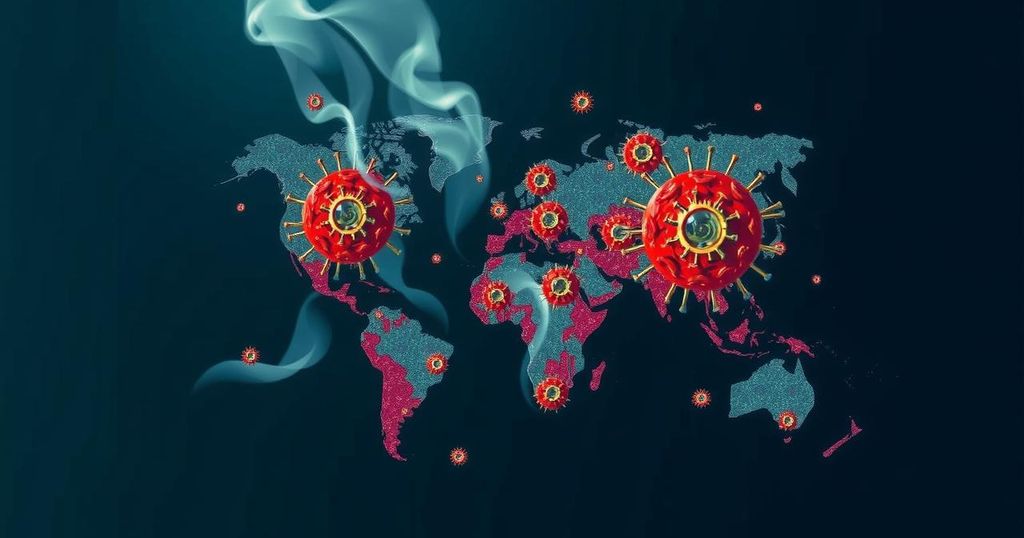A recent report highlights the growing threats to human health driven by climate change, with ten out of fifteen health indicators reaching alarming new records. As the world braces for potentially the hottest year on record, experts warn of the consequences of delayed action, including increased mortality from heat, the spread of infectious diseases, and food insecurity. While there are signs of progress in reducing fossil fuel-related pollution and increasing renewable energy usage, considerable challenges remain due to continuing fossil fuel subsidies.
A recent report has highlighted the escalating threat of climate change on human health in unprecedented ways, as indicated by experts who warn of significant consequences resulting from procrastination on climate action. Released amidst widespread heat waves, wildfires, hurricanes, droughts, and floods, the report suggests that 2023 may become the hottest year recorded so far. This publication comes ahead of the UN’s COP29 talks in Azerbaijan and in a politically charged atmosphere in the United States where elections could influence future climate policies. The eighth Lancet Countdown on health and climate change, created by a consortium of 122 experts including representatives from the World Health Organization, presents alarming findings. Out of fifteen health indicators monitored over eight years, ten have reached alarming new highs. Key issues include the rising incidence of extreme weather events, increased mortality among the elderly due to heat exposure, the proliferation of infectious diseases, and food insecurity due to crop failures caused by adverse weather conditions. According to Marina Romanello, executive director of Lancet Countdown, these trends highlight a deepening crisis that impacts the health and survival of populations globally. The report notes that deaths among individuals aged over 65 due to heat have surged by 167 percent since the 1990s. Additionally, rising temperatures have expanded the habitats of mosquitoes, leading to an increase in diseases such as dengue fever, which reached a record of over five million cases last year. Furthermore, the loss of five percent of global tree cover between 2016 and 2022 has diminished the planet’s capacity to absorb carbon emissions. The report also indicates that major oil and gas corporations, alongside some governments and financial institutions, continue to exacerbate climate change through increased fossil fuel production and substantial subsidies to fossil fuel industries, totaling approximately $1.4 trillion in 2022. Despite these grim statistics, Romanello pointed out some positive developments, such as a decrease of nearly seven percent in deaths caused by fossil fuel-related air pollution from 2016 to 2021, attributed to efforts in reducing coal pollution. Additionally, the usage of clean renewable energy sources for electricity generation has nearly doubled within the same timeframe, reaching ten percent of total consumption. Romanello expressed optimism that upcoming climate negotiations are beginning to prioritize health considerations, yet emphasized the urgent need for immediate action, stating that “there is really no more time to waste.”
Climate change continues to represent a significant threat to global health, affecting populations through an increase in extreme weather events, the spread of diseases, and rising food insecurity. Recent trends indicate a growing acknowledgment of the interconnection between climate health and human health, particularly as the world experiences record temperatures and weather extremes. As global leaders prepare for discussions at the COP29 summit, the urgency for collective action and policy change is more pressing than ever, especially in light of political shifts that may impede climate initiatives in key nations, including the United States.
The report by the Lancet Countdown underscores the dire implications of climate change on human health, with ten out of fifteen monitored indicators showing alarming trends. The impact of escalating temperatures, disease transmission, and agricultural failures is evident, emphasizing the urgent need for immediate and effective action to mitigate these effects. While there are glimpses of progress in pollution reduction and a shift toward renewable energy, significant obstacles remain, particularly in the form of government subsidies to fossil fuels. The call for comprehensive climate action is critical, with the health of future generations at stake.
Original Source: jen.jiji.com






